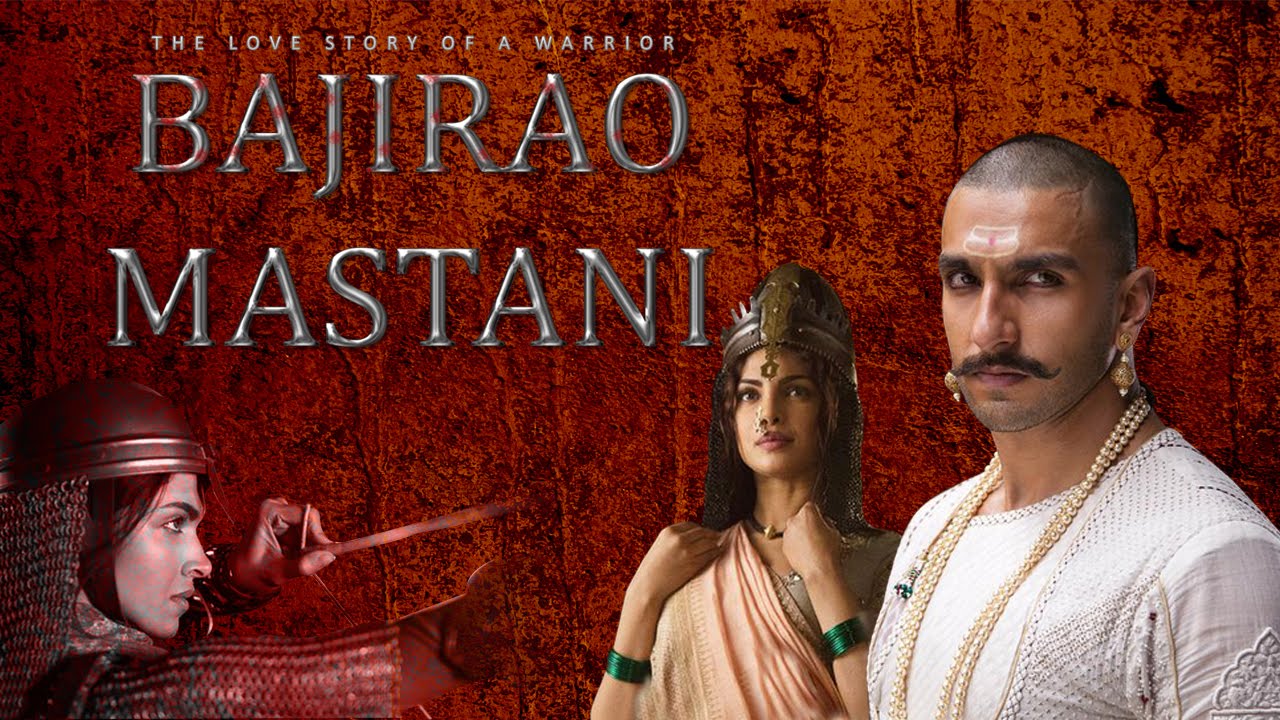



Bajirao Mastani
Year: 2015
Director: Sanjay Leela Bhansali
Cast: Ranveer Singh, Deepika Padukone, Priyanka Chopra, Tanvi Azmi
Sanjay Leela Bhansali’s Bajirao Mastani had faced various obstacles from the time it was announced. The movie, which was originally conceived with Salman Khan and Aishwarya Rai as the main leads, finally got made and saw the light of the day many years later with a new lead pair of Ranveer and Deepika. Then the trailers and teasers evoked a public outrage about how Bhansali had distorted history and demeaned some great communities and personalities. But then the movie got released and many of the detractors accepted that what the film-maker did was with good intentions. They even commended and congratulated him!
I had watched this drama from the sidelines and had not got the opportunity to watch the film. The first day of 2016 changed that. I finally watched Bajirao- Mastani. Here is my take on the film.
The history
By the eighteenth century, the political situation in Maharashtra had changed. The direct heirs of Chhatrapati Shivaji were now just the ornamental rulers based in Satara and the actual state was run by his Prime Minister, the Pune-based Peshwa. Bajirao took over the prime ministerial reigns at a tender age of 20 and over next 20 years went on to become the most accomplished Peshwa of all time. A great warrior who fought and won 41 battles to expand Maratha empire, Bajirao also left behind another legend- his fabled romance with Mastani.
Mastani was Bundelkhand’s Rajput ruler Chhatrasal’s daughter from a Muslim wife. Bajirao rescued a cornered Chhatrasal by defeating the aggressor Mohammed Bangash and the Rajput ruler offered his daughter’s hand to the Peshwa. Mastani was not just a beauty but a trained warrior herself and Bajirao, was totally smitten by her.
Unfortunately this romance was doomed from the beginning. Bajirao was already married to Kashibai and his mother Gopikabai and brother Chimaji Appa were not at all happy about this new liaison. The Peshwa’s ultra-conservative Chitpavan Brahmin community too never assented to his request to accept Mastani as his wedded wife. She was ostracized and humiliated, even jailed when Bajirao was away. The Peshwa died at the age of 40 and Mastani too left this world soon after his demise.
The movie
First let’s begin with the positives. Bhansali mainly bases his film on N.S. Inamdar’s novel ‘Rau’ and largely remains faithful to history. He establishes the Bajirao’s warrior credentials well. The battle scenes are top notch. Depicting palatial grandeur comes naturally to this film-maker and he shows that command once more. The frames he composes are picturesque and the costumes, sets and settings visually arresting. The cinematography is brilliant. The music (by none other than Bhansali again!) is melodious and catchy.
The overall period feel of the eighteenth century is well captured. The supporting cast does an excellent job, especially Tanvi Azmi as Bajirao’s widowed mother Gopikabai, Vaibhav Tatwawadi as brother Chimaji appa and Milind Soman as the trusted advisor are pretty good.
Priyanka Chopra as the wronged wife Kashibai is the scene stealer. The only moving scenes in the film happen when she is in frame- whether with Bajirao, Mastani or Gopikabai.
Now to the things that go wrong. Bhansali wastes an opportunity to create an all-time classic. His storytelling is uneven and by focusing too much on the look of the film, he loses the focus on feel. For a movie celebrating a historic romance, the romantic chemistry never reaches a great high.
After beginning brightly Deepika Padukone’s Mastani slowly becomes lacklustre over the course of the movie. Her performance lacks the spark of her recent incandescent performances. No doubt, Ranveer Singh has put everything into his portrayal and managed to do justice to the warrior side of the great Peshwa; but his romance is hampered by script and historical limitations. His dialogue delivery is in no way Marathi-styled; in fact it seems to be continuing from his Gujju-styled Ram Leela act!
The controversial cinematic liberties (Bajrao breaking into a war dance or Mastani and Kashibai cavorting together in public!) don’t look convincing and don’t really add anything. The costumes and dance steps of the leading ladies at times look out of context in terms of film’s period. The overall dialogues are without any sparkles.
Despite its shortcomings Bajirao Mastani still is a film worth watching for its opulence, grandeur, technical excellence, good performances and more than anything else for the film-maker’s passion. I just wish the film had more emotional depth, the lack of which turns it into a hollow, glossy spectacle where you do not really feel or root for either Bajirao or Mastani!
Rating
3.5 stars